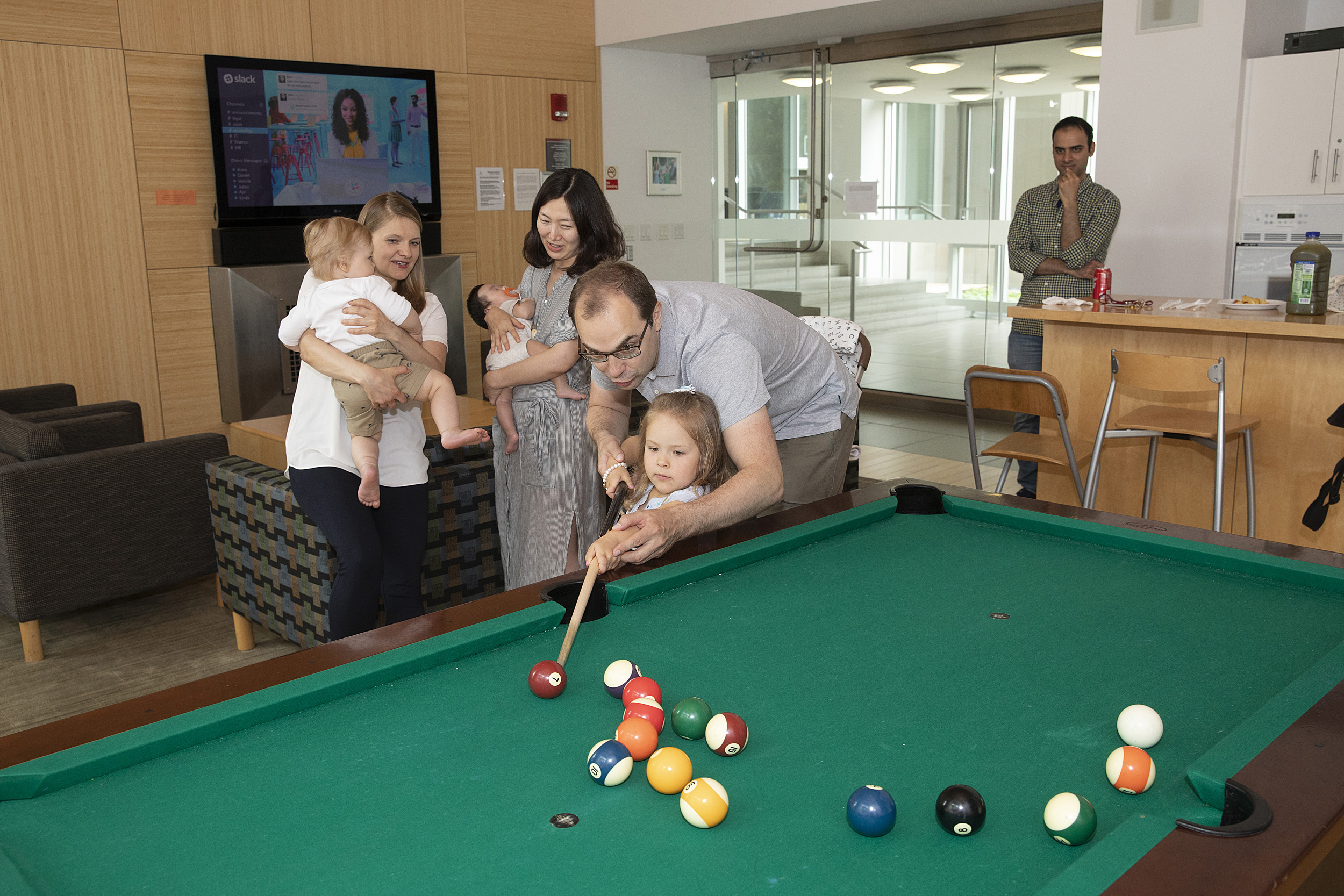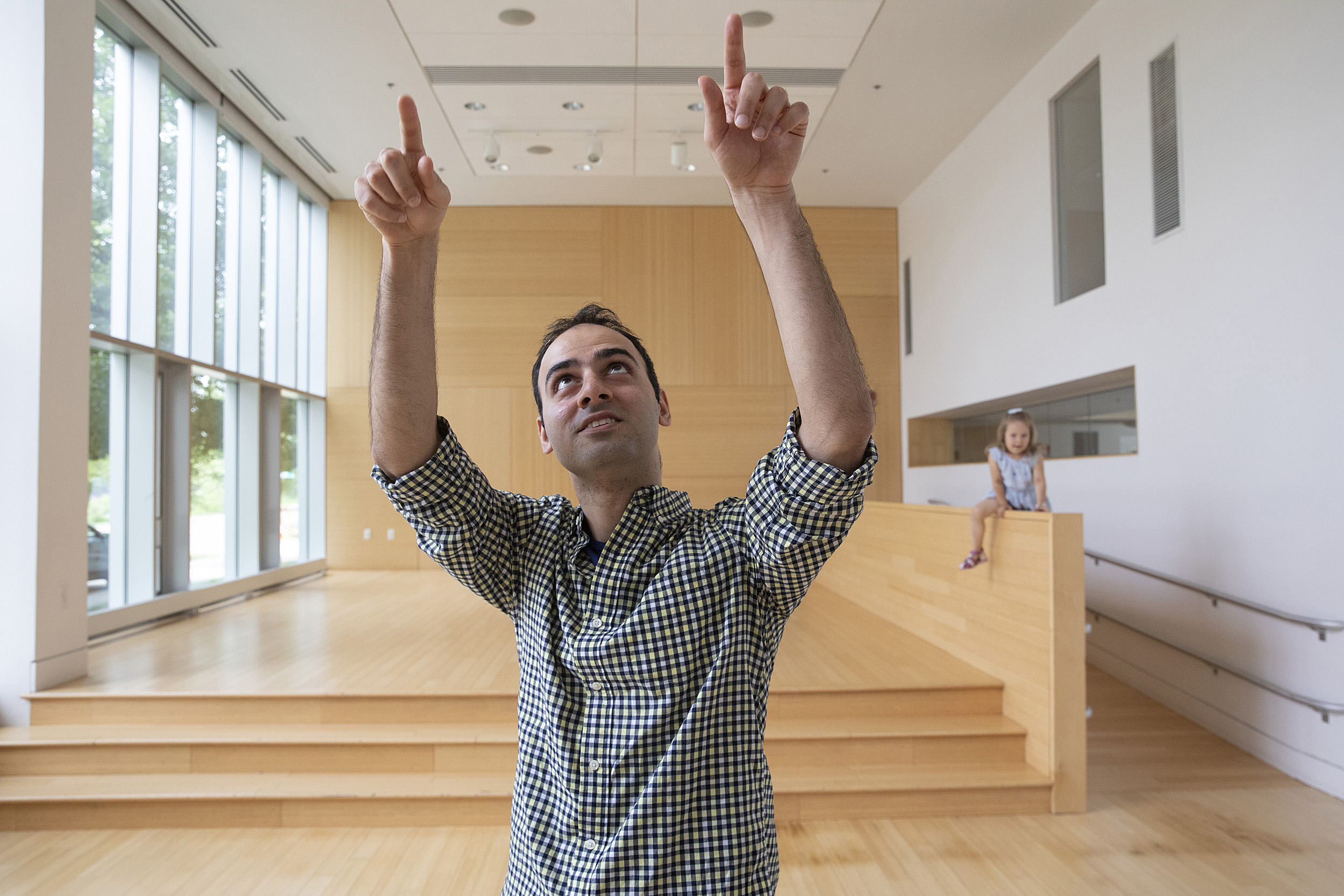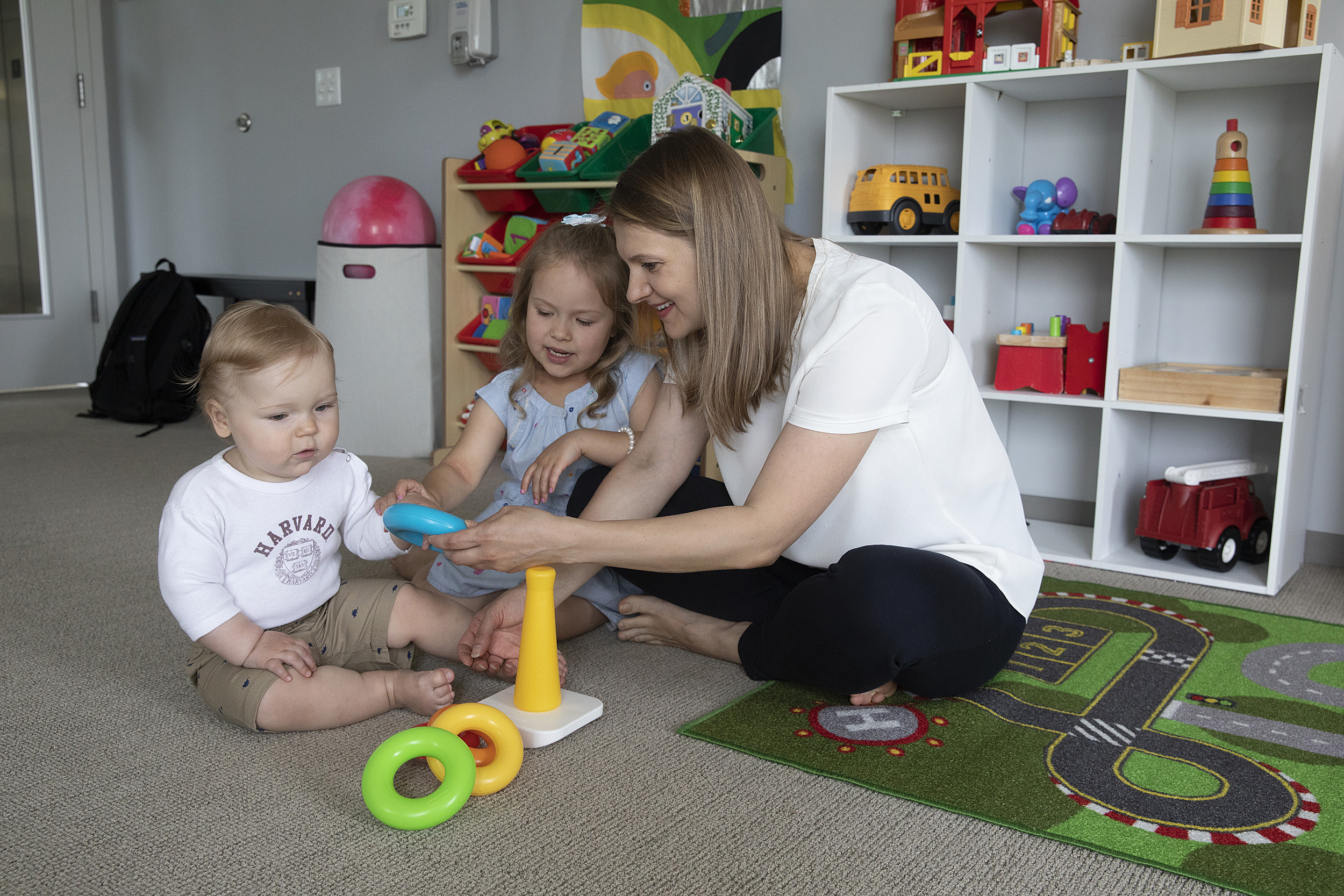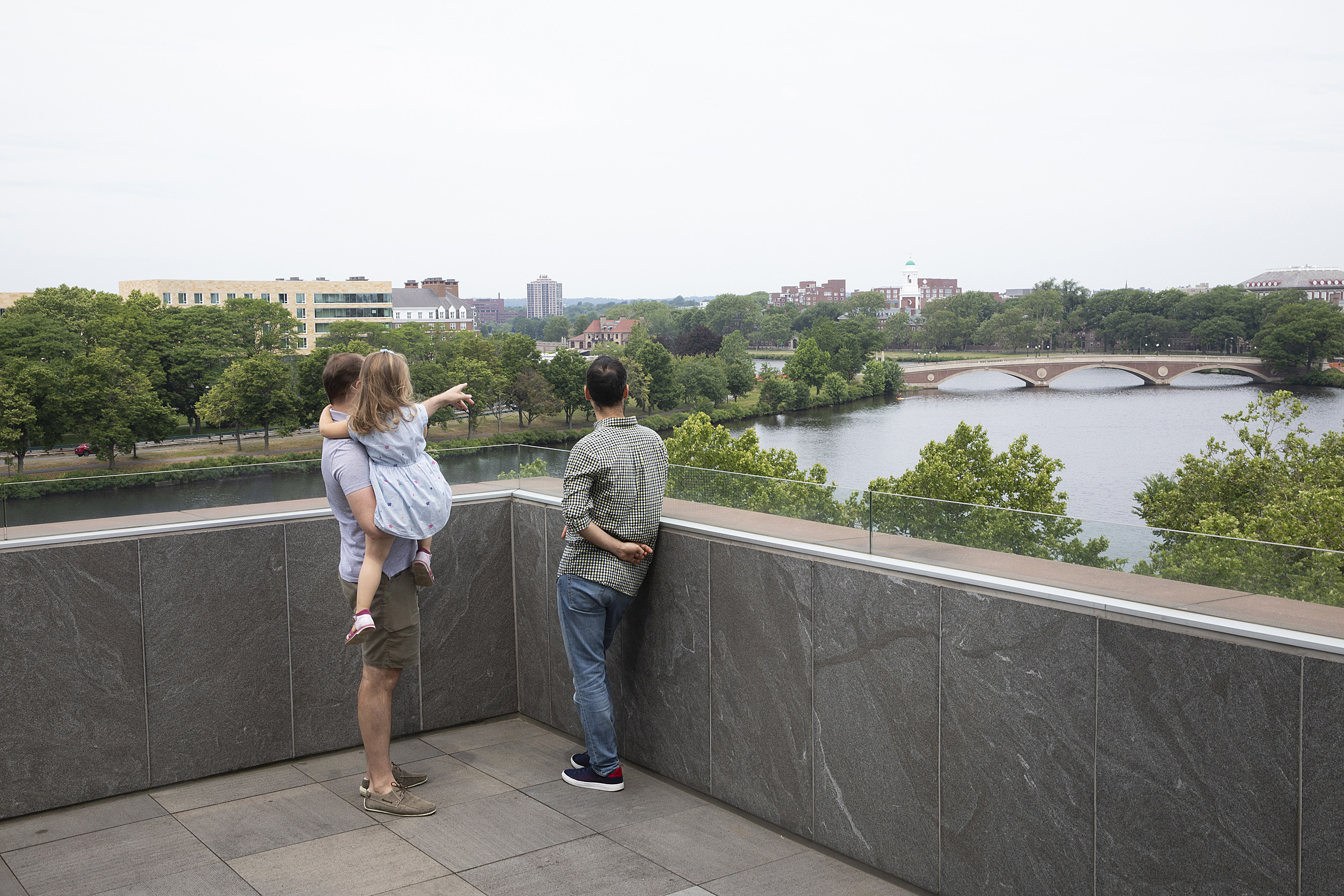
The Graduate Commons Program is key in the life of postdoc researcher Alena Yermalovich (left), holding son Max as she watches her husband, Pavel Paromov, and daughter, Vika, play pool. Fellow resident Haekyoung Shin (center) and her son, Jayson, join their friends in the residential common spaces.
Jon Chase/Harvard Staff Photographer
University community discovers special bond in unique setting
A decade of success marks Harvard Housing’s Graduate Commons Program
Each evening on the seventh floor of 10 Akron St. in Cambridge, Alena Yermalovich and her husband, Pavel Paromov, read to their young children before a stunning view of the Charles River and the Boston skyline.
The couple moved into their Harvard University Housing (HUH) apartment nearly 10 years ago, when Yermalovich became a research assistant at the Harvard T.H. Chan School of Public Health. Their apartment is one of 3,000 units in Harvard Housing’s Graduate Commons Program (GCP), which is marking its 10th anniversary this fall.
“When I applied to the Graduate School of Arts and Sciences Ph.D. program, one of the questions was, ‘Why do you want to be at Harvard?’ And the answer was easy: ‘Because I love my apartment,’” said Yermalovich, now a postdoctoral researcher in the Dana-Farber lab of Matthew Meyerson, Harvard Medical School. “We have watched the Graduate Commons program unfold since the beginning, and it just gets better and better.”
The GCP’s innovative approach offers housing that brings together graduate students, faculty, staff, and their families, through integrative events and programming that fosters community. Its motto is “Live. Laugh. Learn.” Live-in faculty directors and resident community advisers work collaboratively with GCP staff to help ensure HUH residents have the opportunity to experience friendship, diversity, culture, and an exchange of multidisciplinary knowledge outside of the classroom.
“We are from another country, we don’t have family here, but there is such a feeling of community, security, and opportunities for work-life balance, we cannot imagine our life without it,” said Yermalovich, who came to Massachusetts from Belarus in 2003. “The feeling here is that this is your home, and we feel welcome.”
That was one of the goals for Lisa Valela, director of the GCP, who helped launch the Harvard Housing initiative in 2008. What began as a pilot program of 300 University apartments in two buildings near campus is now is a dynamic community accommodating 5,000 residents across 108 buildings in Cambridge, Somerville, and Boston.
“One of the main components of Graduate Commons’ success over the past decade has been its ability to utilize residential common spaces to develop intentional programming mapping back to their four pillars: building community, bridging divides across cultures and disciplines, learning outside the classroom, and service to self and others,” Valela said.
Hundreds of events each year provide enriching and sometimes life-changing social and intellectual opportunities for all residents, including spouses, partners, and children, she said.


Sasan Jalili Firoozinezhad, a Graduate of Arts and Sciences Ph.D. student at Harvard Medical School, describes the airy, open space surrounding him, where presentations and performances occur. Max Paromov, 13 months, plays with his sister, Vika, and mother, Alena Yermalovich, in a large children’s play area.
Jon Chase/Harvard Staff Photographer
Lecture series and dinner discussions; coffee, wine, and game nights; classes in subjects from cooking to fitness; outings to Boston sites; music and sporting events; apple picking; outdoor movie nights; and international holiday and cultural celebrations are just some of the events. Several HUH buildings also offer common spaces for residents, including playrooms, function rooms, community kitchens, patios, and study spaces.
“It’s a basic human need to feel connected to people, and that’s where our strength lies. We are constantly providing different opportunities for people to connect, whether it’s an intellectual event or yoga class or coming down to watch ‘Monday Night Football,’” Valela said. “Imagine what happens at the intersection of life experience and disciplines and cultures, and what can happen when you put those people in the same place.”
Sasan Jalili Firoozinezhad at the Wyss Institute for Biological Engineering is studying toward a Ph.D. in bioengineering. The native of Iran had lived in Switzerland and Portugal before coming to Cambridge in 2016.
“The Graduate Commons Program is very unique in that this housing comes with social programs. When you settle into a community that helps you to feel at home, feel safe, and helps you to settle down, it makes a big difference,” he said. “I have been in many different countries and have never seen anything like this. It has played a great role in my life.”
Firoozinezhad, who will graduate next year, said it is often difficult for an international student to feel comfortable in a new culture for the first time, one reason he enjoys being a resident community adviser at 5 Cowperthwaite St. This past spring, he held Nowruz — a Persian New Year celebration.
“Not only do we have residents from different corners of the world, we also have the ability to get to know people from all over campus,” he said. “This was very important to me, to be in touch with different disciplines. The whole experience is quite unique.”
Sharing expertise in the Harvard community is not unfamiliar to Maggie Gardner ’02, Harvard Law School ’07. During her time as a Climenko Fellow from 2013‒17, she and her husband, Jeff Holden, were community advisers at Botanic Gardens, and felt enriched by the scope of multidisciplinary interaction there.
They recall when one of their neighbors suggested borrowing a telescope from the Harvard Center for Astrophysics and offered to volunteer his expertise so residents could get a different view of the night sky. Gardner and Holden arranged the event through the GCP and within minutes people came from all over to see the moon, Jupiter, and constellations.
“It was out on the sidewalk and it was packed. Adults were excited, kids were in pajamas looking through this large telescope,” said Gardner, now an assistant professor of law at Cornell University. “As a community member, having those kinds of super-valuable experiences where you can get outside of your expertise is really good for developing ideas and letting off steam.”
Holden, an information technology professional out of Ithaca, N.Y., said spouses of Harvard affiliates often are not primary in the process, coming to Cambridge without jobs or a long expected stay. For them, the GCP provides fantastic solutions.

On the outdoor terrace, Paromov (left) and Vika are joined by Sasan Jalili Firoozinezhad as they enjoy the view of the Charles River.
Jon Chase/Harvard Staff Photographer
“Maggie was our anchor into the community, but I got a lot out of it as a partner. You can drop in and get a bite to eat, or you can have something much deeper,” he said. “I made a lot of friends I wouldn’t have made otherwise, I felt supported, and this is really important.”
Paromov agrees. Originally from Russia, he currently practices law in Suffolk County. He and Yermalovich are the playroom managers at 10 Akron St., a place where he can escape the seriousness of his work.
“Managing the playroom doesn’t feel like work. We interact with other young families, and have made many friends from all over the world,” he said. “It’s a very good way to relax.”
The couple actually started their family as GCP residents. Their daughter, Victoria, is now 4, and their son, Max, is 1. Because the family speak Russian at home, Yermalovich was worried that her children might feel intimidated, but instead found many other parents speaking in their native language.
“Our children are the luckiest in the world,” she said. “The program ensures we don’t feel deprived of anything.”
Maura Petty, the property manager of HUH’s Mount Auburn Group, said she approaches her job by remembering that each resident has a unique story. She does, too. Petty started as a summer employee at HUH while she was still in high school, working every summer until she graduated college, and became a permanent employee in 2002.
“You can feel the passion of every member of the team, their genuine desire to meet residents, learn their stories, and offer support, it’s what sets the GCP apart,” she said. “They build community among the disciplines in a housing situation that could otherwise be very isolating for many folks.”
Valela said the vision for the GCP is simple because it’s all about the people.
“We get to meet amazing people — hard-working, inspirational people who just want to make a difference in the world,” she said, “And they can do that from right here, their Harvard home.”




